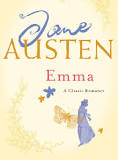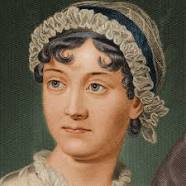Emma Page #5
Emma, by Jane Austen, is a novel about youthful hubris and the perils of misconstrued romance. The story takes place in the fictional village of Highbury and the surrounding estates of Hartfield, Randalls, and Donwell Abbey and involves the relationships among individuals in those locations consisting of "3 or 4 families in a country village". The novel was first published in December 1815 while the author was alive, with its title page listing a publication date of 1816. As in her other novels, Austen explores the concerns and difficulties of genteel women living in Georgian–Regency England; she also creates a lively comedy of manners among her characters and depicts issues of marriage, gender, age, and social status.
Real, long-standing regard brought the Westons and Mr. Knightley; and by Mr. Elton, a young man living alone without liking it, the privilege of exchanging any vacant evening of his own blank solitude for the elegancies and society of Mr. Woodhouse's drawing-room, and the smiles of his lovely daughter, was in no danger of being thrown away. After these came a second set; among the most come-at-able of whom were Mrs. and Miss Bates, and Mrs. Goddard, three ladies almost always at the service of an invitation from Hartfield, and who were fetched and carried home so often, that Mr. Woodhouse thought it no hardship for either James or the horses. Had it taken place only once a year, it would have been a grievance. Mrs. Bates, the widow of a former vicar of Highbury, was a very old lady, almost past every thing but tea and quadrille. She lived with her single daughter in a very small way, and was considered with all the regard and respect which a harmless old lady, under such untoward circumstances, can excite. Her daughter enjoyed a most uncommon degree of popularity for a woman neither young, handsome, rich, nor married. Miss Bates stood in the very worst predicament in the world for having much of the public favour; and she had no intellectual superiority to make atonement to herself, or frighten those who might hate her into outward respect. She had never boasted either beauty or cleverness. Her youth had passed without distinction, and her middle of life was devoted to the care of a failing mother, and the endeavour to make a small income go as far as possible. And yet she was a happy woman, and a woman whom no one named without good-will. It was her own universal good-will and contented temper which worked such wonders. She loved every body, was interested in every body's happiness, quicksighted to every body's merits; thought herself a most fortunate creature, and surrounded with blessings in such an excellent mother, and so many good neighbours and friends, and a home that wanted for nothing. The simplicity and cheerfulness of her nature, her contented and grateful spirit, were a recommendation to every body, and a mine of felicity to herself. She was a great talker upon little matters, which exactly suited Mr. Woodhouse, full of trivial communications and harmless gossip. Mrs. Goddard was the mistress of a School--not of a seminary, or an establishment, or any thing which professed, in long sentences of refined nonsense, to combine liberal acquirements with elegant morality, upon new principles and new systems--and where young ladies for enormous pay might be screwed out of health and into vanity--but a real, honest, old-fashioned Boarding-school, where a reasonable quantity of accomplishments were sold at a reasonable price, and where girls might be sent to be out of the way, and scramble themselves into a little education, without any danger of coming back prodigies. Mrs. Goddard's school was in high repute--and very deservedly; for Highbury was reckoned a particularly healthy spot: she had an ample house and garden, gave the children plenty of wholesome food, let them run about a great deal in the summer, and in winter dressed their chilblains with her own hands. It was no wonder that a train of twenty young couple now walked after her to church. She was a plain, motherly kind of woman, who had worked hard in her youth, and now thought herself entitled to the occasional holiday of a tea-visit; and having formerly owed much to Mr. Woodhouse's kindness, felt his particular claim on her to leave her neat parlour, hung round with fancy-work, whenever she could, and win or lose a few sixpences by his fireside. These were the ladies whom Emma found herself very frequently able to collect; and happy was she, for her father's sake, in the power; though, as far as she was herself concerned, it was no remedy for the absence of Mrs. Weston. She was delighted to see her father look comfortable, and very much pleased with herself for contriving things so well; but the quiet prosings of three such women made her feel that every evening so spent was indeed one of the long evenings she had fearfully anticipated. As she sat one morning, looking forward to exactly such a close of the present day, a note was brought from Mrs. Goddard, requesting, in most respectful terms, to be allowed to bring Miss Smith with her; a most welcome request: for Miss Smith was a girl of seventeen, whom Emma knew very well by sight, and had long felt an interest in, on account of her beauty. A very gracious invitation was returned, and the evening no longer dreaded by the fair mistress of the mansion. Harriet Smith was the natural daughter of somebody. Somebody had placed her, several years back, at Mrs. Goddard's school, and somebody had lately raised her from the condition of scholar to that of parlour-boarder. This was all that was generally known of her history. She had no visible friends but what had been acquired at Highbury, and was now just returned from a long visit in the country to some young ladies who had been at school there with her. She was a very pretty girl, and her beauty happened to be of a sort which Emma particularly admired. She was short, plump, and fair, with a fine bloom, blue eyes, light hair, regular features, and a look of great sweetness, and, before the end of the evening, Emma was as much pleased with her manners as her person, and quite determined to continue the acquaintance. She was not struck by any thing remarkably clever in Miss Smith's conversation, but she found her altogether very engaging--not inconveniently shy, not unwilling to talk--and yet so far from pushing, shewing so proper and becoming a deference, seeming so pleasantly grateful for being admitted to Hartfield, and so artlessly impressed by the appearance of every thing in so superior a style to what she had been used to, that she must have good sense, and deserve encouragement. Encouragement should be given. Those soft blue eyes, and all those natural graces, should not be wasted on the inferior society of Highbury and its connexions. The acquaintance she had already formed were unworthy of her. The friends from whom she had just parted, though very good sort of people, must be doing her harm. They were a family of the name of Martin, whom Emma well knew by character, as renting a large farm of Mr. Knightley, and residing in the parish of Donwell--very creditably, she believed--she knew Mr. Knightley thought highly of them--but they must be coarse and unpolished, and very unfit to be the intimates of a girl who wanted only a little more knowledge and elegance to be quite perfect. She would notice her; she would improve her; she would detach her from her bad acquaintance, and introduce her into good society; she would form her opinions and her manners. It would be an interesting, and certainly a very kind undertaking; highly becoming her own situation in life, her leisure, and powers.
Translation
Translate and read this book in other languages:
Select another language:
- - Select -
- 简体中文 (Chinese - Simplified)
- 繁體中文 (Chinese - Traditional)
- Español (Spanish)
- Esperanto (Esperanto)
- 日本語 (Japanese)
- Português (Portuguese)
- Deutsch (German)
- العربية (Arabic)
- Français (French)
- Русский (Russian)
- ಕನ್ನಡ (Kannada)
- 한국어 (Korean)
- עברית (Hebrew)
- Gaeilge (Irish)
- Українська (Ukrainian)
- اردو (Urdu)
- Magyar (Hungarian)
- मानक हिन्दी (Hindi)
- Indonesia (Indonesian)
- Italiano (Italian)
- தமிழ் (Tamil)
- Türkçe (Turkish)
- తెలుగు (Telugu)
- ภาษาไทย (Thai)
- Tiếng Việt (Vietnamese)
- Čeština (Czech)
- Polski (Polish)
- Bahasa Indonesia (Indonesian)
- Românește (Romanian)
- Nederlands (Dutch)
- Ελληνικά (Greek)
- Latinum (Latin)
- Svenska (Swedish)
- Dansk (Danish)
- Suomi (Finnish)
- فارسی (Persian)
- ייִדיש (Yiddish)
- հայերեն (Armenian)
- Norsk (Norwegian)
- English (English)
Citation
Use the citation below to add this book to your bibliography:
Style:MLAChicagoAPA
"Emma Books." Literature.com. STANDS4 LLC, 2025. Web. 23 Feb. 2025. <https://www.literature.com/book/emma_29>.








Discuss this Emma book with the community:
Report Comment
We're doing our best to make sure our content is useful, accurate and safe.
If by any chance you spot an inappropriate comment while navigating through our website please use this form to let us know, and we'll take care of it shortly.
Attachment
You need to be logged in to favorite.
Log In